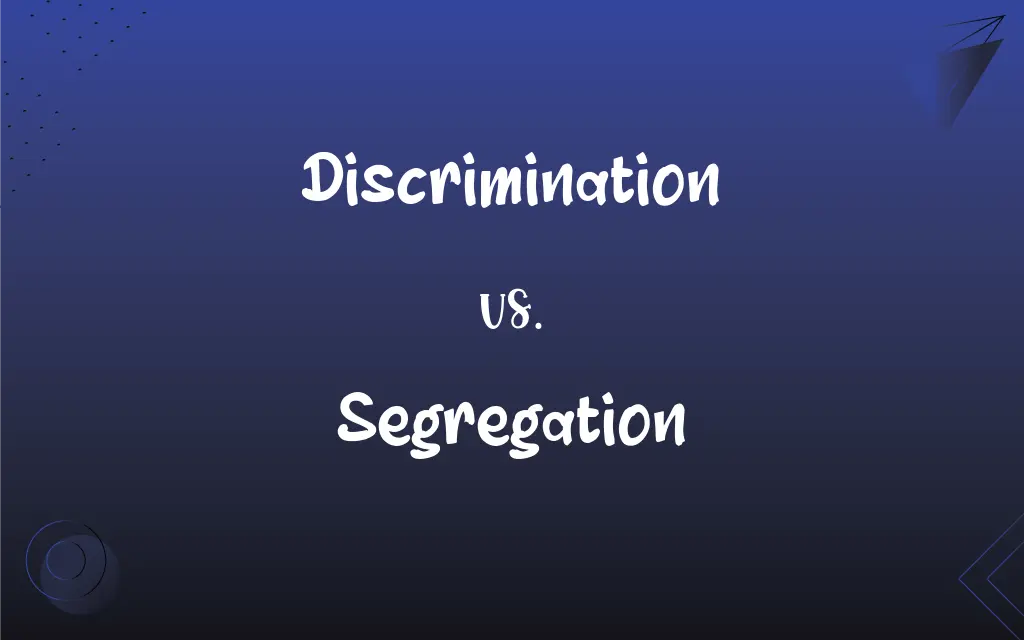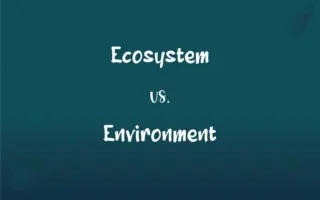Discrimination vs. Segregation: What's the Difference?
Edited by Harlon Moss || By Janet White || Published on October 17, 2023
Discrimination is the unjust or prejudicial treatment of different categories of people, while segregation is the enforced separation of different racial groups.

Key Differences
Discrimination involves treating individuals or groups unfairly based on their characteristics such as race, gender, age, religion, or disability. This unfair treatment can manifest in various forms, including biases, stereotypes, and prejudices, and can occur in different settings, such as the workplace, educational institutions, or public services. Conversely, segregation is the practice or policy of separating people based on their race or other characteristics. It often refers to the legal or societal enforced separation of racial or ethnic groups, restricting their access to shared public or private resources, services, and opportunities.
Discrimination can be both subtle and overt, affecting people's opportunities, rights, and experiences, often leading to inequality and exclusion. It can be based on numerous factors and can manifest in different behaviors, decisions, and policies. Segregation, on the other hand, is more structural and systemic, involving the physical separation and isolation of different groups, often imposed through laws, policies, or societal norms. While discrimination focuses more on unfair treatment, segregation emphasizes separation and isolation.
Both discrimination and segregation can lead to the marginalization of individuals and groups, impacting their social, economic, and educational opportunities. However, while discrimination is broader and can occur between individuals or be institutional, segregation is usually a form of institutional discrimination where groups are separated by law, policy, or practice. It can be viewed as an extreme form of discrimination where entire groups are isolated and separated from one another, leading to a lack of interaction and understanding.
While discrimination and segregation have historical roots, they continue to exist in various forms today. Efforts to combat discrimination involve promoting equality, diversity, and inclusion, and addressing biases and prejudices. To counter segregation, it is crucial to promote integration, equal access, and opportunities for all, regardless of their race, ethnicity, or other characteristics. It involves dismantling barriers that prevent interaction and access and fostering environments that are inclusive and diverse.
Addressing both discrimination and segregation is vital in fostering social cohesion, equality, and justice. The elimination of discriminatory practices and segregationist policies is crucial for the creation of inclusive societies where diversity is valued, and everyone has equal rights and opportunities. While they are interconnected, addressing discrimination involves tackling unfair treatment and biases, whereas combating segregation requires dismantling barriers of separation and promoting integration and interaction between different groups.
ADVERTISEMENT
Comparison Chart
Nature
Unjust or prejudicial treatment.
Enforced separation of different racial groups.
Manifestation
Can be both subtle and overt.
Typically structural and systemic.
Focus
Inequality and unfair treatment.
Isolation and separation.
Resolution
Promoting equality, diversity, and inclusion.
Promoting integration and equal access.
Outcome
Leads to inequality and exclusion.
Leads to isolation and lack of interaction.
ADVERTISEMENT
Discrimination and Segregation Definitions
Discrimination
The unjust treatment of different people based on race, age, or gender.
Discrimination in the workplace can hinder career advancement for minorities.
Segregation
The action or state of setting someone or something apart from others.
School segregation still impacts educational opportunities in some areas.
Discrimination
The unequal treatment of individuals based on their attributes, denying them rights or benefits.
The fight against racial discrimination is ongoing.
Segregation
Isolation of one group of individuals from others within a society or an area, typically due to racial, social, or economic differences.
Residential segregation can lead to disparate access to public services.
Discrimination
Prejudicial treatment of individuals based on their membership in a certain group.
Laws are in place to protect individuals from discrimination based on sexual orientation.
Segregation
The enforced separation of different racial groups in a country, community, or establishment.
Segregation was legally mandated in the United States until the mid-20th century.
Discrimination
Unfair or prejudicial regard for or treatment of an individual based on perceived characteristics.
Discrimination often stems from fear and misunderstanding.
Segregation
The policy or practice of separating people of different races, classes, or ethnic groups, especially as a form of discrimination.
The harmful effects of segregation continue to perpetuate inequality.
Discrimination
The act of making unjustified distinctions between human beings based on the groups, classes, or other categories to which they are perceived to belong.
Discrimination can lead to a lack of diversity in certain sectors.
Segregation
The act of being set apart, causing or being caused by inequality within groups.
Ending segregation is a crucial step toward achieving societal equality.
Discrimination
The act of discriminating.
Segregation
The act or process of segregating or the condition of being segregated.
Discrimination
The ability or power to see or make fine distinctions; discernment.
Segregation
The policy or practice of separating people of different races, classes, or ethnic groups, as in schools, housing, and public or commercial facilities, especially as a form of discrimination.
Discrimination
Treatment or consideration based on class or category, such as race or gender, rather than individual merit; partiality or prejudice.
Segregation
(Genetics) The separation of paired alleles or homologous chromosomes, especially during meiosis, so that the members of each pair appear in different gametes.
Discrimination
Discernment, the act of discriminating, discerning, distinguishing, noting or perceiving differences between things, with the intent to understand rightly and make correct decisions.
Segregation
The setting apart or separation of things or people, as a natural process, a manner of organizing people that may be voluntary or enforced by law.
Discrimination
Differential treatment of an individual or group to their disadvantage; treatment or consideration based on class or category rather than individual merit; partiality; prejudice; bigotry.
Sexual or racial discrimination
Reverse discrimination
Segregation
(biology) The setting apart in Mendelian inheritance of alleles, such that each parent passes only one allele to its offspring.
Discrimination
(uncountable) The quality of being discriminating; acute discernment, especially in matters of good taste.
Segregation
(mineralogy) Separation from a mass, and gathering about centers or into cavities at hand through cohesive or adhesive attraction or the crystallizing process.
Discrimination
That which discriminates; a distinguishing mark, a characteristic.
Segregation
The separation of people (geographically, residentially, or in businesses, public transit, etc) into racial or other categories (e.g. religion, sex).
Discrimination
The act of discriminating, distinguishing, or noting and marking differences.
To make an anxious discrimination between the miracle absolute and providential.
Segregation
(sociology) The separation of people (geographically, residentially, or in businesses, public transit, etc) into various categories which occurs due to social forces (culture, etc).
Discrimination
The state of being discriminated, distinguished, or set apart.
Segregation
(genetics) The separation of a pair of chromatids or chromosomes during mitosis and meiosis
Discrimination
The arbitrary imposition of unequal tariffs for substantially the same service.
A difference in rates, not based upon any corresponding difference in cost, constitutes a case of discrimination.
Segregation
The act of segregating, or the state of being segregated; separation from others; a parting.
Discrimination
The quality of being discriminating; faculty of nicely distinguishing; acute discernment; as, to show great discrimination in the choice of means.
Segregation
Separation from a mass, and gathering about centers or into cavities at hand through cohesive attraction or the crystallizing process.
Discrimination
That which discriminates; mark of distinction.
Segregation
(genetics) the separation of paired alleles during meiosis so that members of each pair of alleles appear in different gametes
Discrimination
Unfair treatment of a person or group on the basis of prejudice
Segregation
A social system that provides separate facilities for minority groups
Discrimination
The cognitive process whereby two or more stimuli are distinguished
Segregation
The act of segregating or sequestering;
Sequestration of the jury
FAQs
Can discrimination be positive?
Some argue affirmative action is “positive” discrimination, but the term generally refers to unjust treatment.
Were there laws enforcing segregation?
Yes, "Jim Crow" laws in the U.S. enforced racial segregation until the 1960s.
Is discrimination only based on race?
No, discrimination can be based on various attributes like gender, age, religion, etc.
Can discrimination occur at the institutional level?
Yes, institutional discrimination involves policies or practices that disadvantage certain groups.
Can discrimination lead to segregation?
Yes, pervasive discrimination can institutionalize and lead to the segregation of different groups.
Is segregation always racial?
No, segregation can also occur based on ethnicity, economic status, religion, etc.
Can segregation be voluntary?
While typically enforced, some groups may self-segregate due to cultural, social, or other reasons.
Can education reduce discrimination?
Education can raise awareness, challenge biases, and promote inclusivity, thereby helping to reduce discrimination.
Can addressing discrimination lead to the elimination of segregation?
Addressing and combating discrimination is a step toward eliminating segregation but addressing systemic and structural issues is also crucial.
Can segregation have long-lasting effects on communities?
Yes, segregation can lead to enduring economic, social, and educational disparities.
Can discrimination be unintentional?
Yes, unintentional discrimination can occur due to implicit biases or systemic issues.
Is segregation only a thing of the past?
While legally mandated segregation is mostly in the past, de facto segregation still exists in various forms.
Can laws fully eliminate discrimination?
Laws can prohibit discriminatory practices, but addressing underlying attitudes and biases is also necessary for true equality.
Is there a relationship between segregation and inequality?
Yes, segregation fosters and perpetuates inequality by isolating groups and limiting access to opportunities and resources.
Is eliminating segregation sufficient to achieve equality?
Eliminating segregation is crucial, but achieving equality also requires addressing systemic discrimination, biases, and disparities.
About Author
Written by
Janet WhiteJanet White has been an esteemed writer and blogger for Difference Wiki. Holding a Master's degree in Science and Medical Journalism from the prestigious Boston University, she has consistently demonstrated her expertise and passion for her field. When she's not immersed in her work, Janet relishes her time exercising, delving into a good book, and cherishing moments with friends and family.
Edited by
Harlon MossHarlon is a seasoned quality moderator and accomplished content writer for Difference Wiki. An alumnus of the prestigious University of California, he earned his degree in Computer Science. Leveraging his academic background, Harlon brings a meticulous and informed perspective to his work, ensuring content accuracy and excellence.







































































